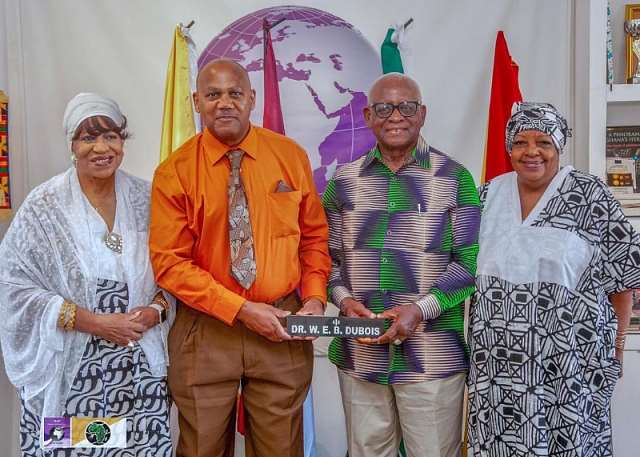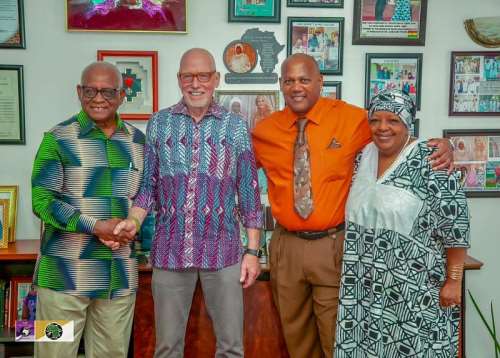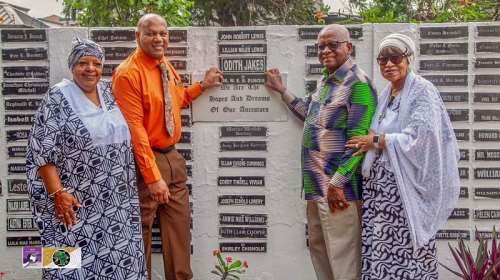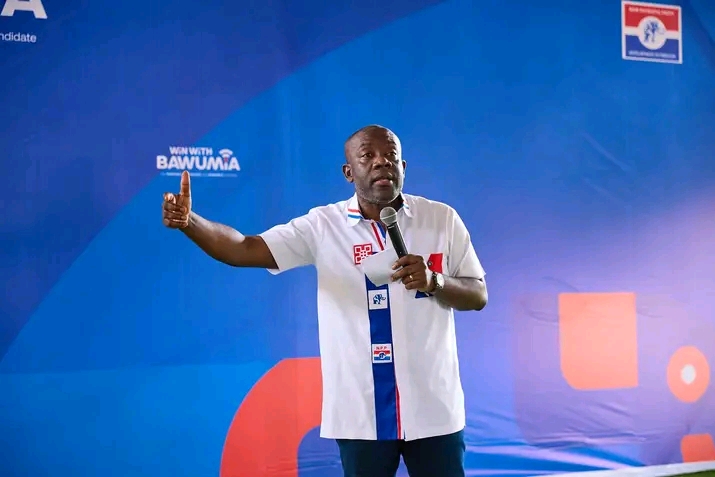By: Emmanuel Amoah
Jeffrey Alan Peck, the great-grandson of the iconic African-American scholar and civil rights activist W.E.B. Du Bois, has made a poignant journey back to Ghana, seeking to reconnect with his family’s storied legacy. Sixty years ago, Du Bois, a pivotal figure in the Pan-African movement, chose Ghana as his final resting place, a testament to his deep ties to the African continent.
During his visit, Peck participated in a symposium dedicated to celebrating his great-grandfather’s extraordinary life and contributions. The event brought together scholars and dignitaries who discussed Du Bois’ enduring influence on both Pan-Africanism and the global fight for racial equality. Peck’s visit was further marked by a significant meeting with Ghanaian President Nana Addo Dankwa Akufo-Addo, underscoring the profound connection between Du Bois’ legacy and Ghana’s contemporary history.
A particularly moving part of Peck’s journey was his visit to the Du Bois Memorial Centre for Pan African Culture in Accra. There, he had the opportunity to pay his respects at the gravesite of his great-grandfather, reflecting on the profound impact Du Bois had in advancing the causes of racial justice and social equality.

Peck’s return to Ghana was more than a personal pilgrimage; it was an effort to reignite the legacy of his great-grandfather and to deepen the connection between Du Bois’ pioneering work and the nation that became his adopted home. This visit highlights the enduring relevance of Du Bois’ ideas and the powerful resonance of his message in the ongoing struggle for equality and justice.
William Edward Burghardt Du Bois born on February 23, 1868 – August 27, 1963 was an American sociologist, socialist, historian, and Pan-Africanist civil rights activist.
Born in Great Barrington, Massachusetts, Du Bois grew up in a relatively tolerant and integrated community. After completing graduate work at the Friedrich Wilhelm University in Berlin and Harvard University, where he was its first African American to earn a doctorate, Du Bois rose to national prominence as a leader of the Niagara Movement, a group of black civil rights activists seeking equal rights.

Du Bois and his supporters opposed the Atlanta Compromise. Instead, Du Bois insisted on full civil rights and increased political representation, which he believed would be brought about by the African-American intellectual elite. He referred to this group as the Talented Tenth, a concept under the umbrella of racial uplift, and believed that African Americans needed the chances for advanced education to develop its leadership.
Du Bois was one of the founders of the National Association for the Advancement of Colored People (NAACP) in 1909. Du Bois used his position in the NAACP to respond to racist incidents. After the First World War, he attended the Pan-African Congresses, embraced socialism and became a professor at Atlanta University. Once the Second World War had ended, he engaged in peace activism and was targeted by the FBI. He spent the last years of his life in Ghana and died in Accra on August 27, 1963.
Du Bois was a prolific author and primarily targeted racism in his polemics, which protested strongly against lynching, Jim Crow laws, and discrimination in education and employment. His cause included people of color everywhere, particularly Africans and Asians in colonies.

He was a proponent of Pan-Africanism and helped organize several Pan-African Congresses to fight for the independence of African colonies from European powers. Du Bois made several trips to Europe, Africa and Asia. His collection of essays, The Souls of Black Folk, is a seminal work in African-American literature; and his 1935 magnum opus, Black Reconstruction in America, challenged the prevailing orthodoxy that blacks were responsible for the failures of the Reconstruction era.
Borrowing a phrase from Frederick Douglass, he popularized the use of the term color line to represent the injustice of the separate but equal doctrine prevalent in American social and political life. His 1940 autobiography Dusk of Dawn is regarded in part as one of the first scientific treatises in the field of American sociology.
In his role as editor of the NAACP’s journal The Crisis, he published many influential pieces. Du Bois believed that capitalism was a primary cause of racism and was sympathetic to socialist causes.






